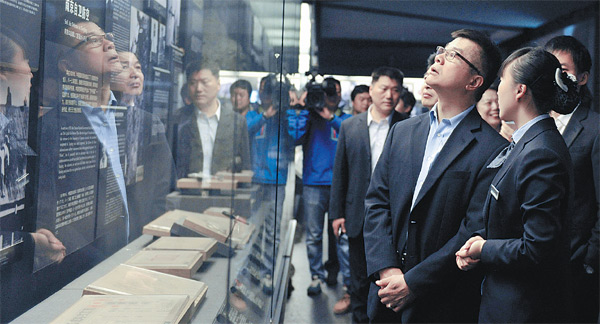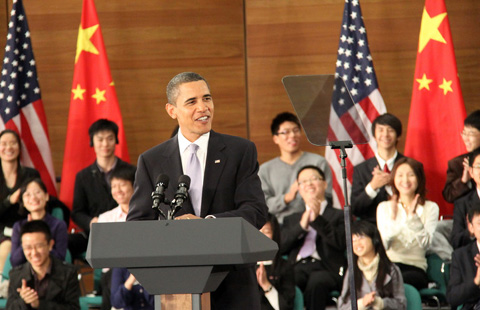Former US ambassador pays tribute to victims of Nanjing Massacre
By Zhao Yanrong (China Daily) Updated: 2014-04-25 07:13
 |
|
Former US ambassador to China Gary Locke visits the Nanjing Massacre Memorial Hall on Thursday. At least 300,000 Chinese civilians and unarmed soldiers were killed by invading Japanese troops during a six-week period starting in December 1937. PROVIDED TO CHINA DAILY |
Former US ambassador to China Gary Locke paid an unexpected visit to the Nanjing Massacre Memorial Hall on Thursday, saying "history cannot be forgotten".
It was his first visit to the hall honoring the victims of the Nanjing Massacre, in which at least 300,000 Chinese civilians and unarmed soldiers were killed by Japanese troops in six weeks starting in December 1937.
Locke encouraged more people to visit the memorial hall, which was the site of an execution area and a mass grave during the cruel slaughter, to learn from the tragic event, Xinhua reported.
The memorial hall did not receive advance notice of Locke's visit, and he was hosted by normal museum staff members, a museum employee said.
Locke spent more than an hour in the museum, and the first question he asked museum employees was how many Chinese were killed during the War of Resistance against Japanese Aggression (1937-45).
In the middle of the memorial hall, the ambassador took a moment of silence after looking up to see a board that read "300,000", the rough number of victims of the Japanese aggression, Xinhua said.
Besides the main hall, Locke visited the sculpture depicting the scene of the massacre as well as the second exhibition hall, which houses the "Mass Grave of 10,000".
In an interview with Xinhua, Locke said the US position of neutrality on the Diaoyu Islands had not changed, and his visit to the memorial hall was not meant to be political.
Zhu Chengshan, curator of the memorial hall, confirmed Locke's visit and said he was not able to escort the US guest since he was out of town on a business trip.
Locke was the 10th US ambassador to China, but the first US official of Chinese descent to hold the position. He resigned in February to join his family in the US.
Locke's visit to the memorial hall comes after Tokyo's continuous denial of history and hard-line position on the territorial dispute.
Japanese Prime Minister Shinzo Abe sent a sacred tree branch engraved with his name and official title to Tokyo's Yasukuni Shrine, where Class-A war criminals are enshrined. In December, Abe, in his second term, visited the shrine and expressed "great regret" over not visiting during his first term as prime minister in 2006-07.
Abe's action seriously damaged the country's relations with China and South Korea, two countries victimized by Japan during World War II.
Former Japanese prime minister Yasuo Fukuda expressed his concern over the relationship between Japan and China, as well as between Japan and South Korea, on Tuesday in Yangzhou, another city in Jiangsu.
"As someone who used to be the prime minister, I believe people from the three countries have not opened their minds to the historical issues. As a Japanese citizen, I think we should learn from history. The current Japanese government should not rashly change the commitments made by former governments," he said.
zhaoyanrong@chinadaily.com.cn
- Citizens honor Nanjing Massacre victims
- Number of victims in Nanjing Massacre irrefutable
- Nanjing Massacre Memorial Holiday
- Memorial days set for mourning Nanjing Massacre
- China plans Nanjing Massacre memorial day
- China plans national days on Nanjing Massacre, anti-Japanese war victory
- Nanjing Massacre is undeniable
- China slams NHK's denial of Nanjing massacre










